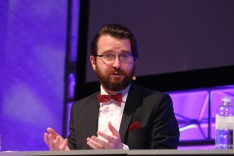(Marketing) Science needs debate to progress
 Marketing science has become a fashionable term, but we need to stimulate a genuine debate around its concepts before it can be considered real science argues Phil Phelan.
Marketing science has become a fashionable term, but we need to stimulate a genuine debate around its concepts before it can be considered real science argues Phil Phelan.
Marketing science in its current incarnation is not the strong force for progress our industry needs it be.
At best it keeps the idea of science as a ‘good thing’ visible, at worst it’s a comfortably numbing replacement for having to think about how to deal with change and uncertainty. What’s missing is debate. The kind of robust debates that characterise truly scientific communities, that make people question, explore, challenge and ultimately progress.
Ironically, it was speaking on a Marketing Science panel debate at MSiX that highlighted the issue for me.


Hmmm. Marketing Science has become a fashionable industry concept? With the Academy of Marketing Science kicking off with its journal in 1971 I think the author has come in at least around 44 years too late. Unless we are talking retro cool. Science progresses with consilience not debate.
I face palm and question the importance of science in marketing when I see comments like “understanding the causality between media investment and sales outcomes” from the owner of one of the largest data analytics company in Australia.
‘Causality’ is a big word in science.
Hi Gav
I too was born in the 70’s and yet I still remain unfashionable despite my best efforts.
As I noted on the panel discussion itself marketing science has been around for a long time, Andrew Ehrenberg was practicing what I’d call marketing science in the mid 50’s and he wasn’t alone in doing so at the time. It’s not new, but it is a lot more fashionable for an array of reasons.
Agree consilience is an important concept in scientific progress, but notably is one that relies on many independant players with different lens’ engaged in robust analysis, not everyone re-tweeting the first paper on a subject.
Well said, Phil. A big challenge I see is that, while science generally embraces getting it wrong as there are always things you can learn, if a failure can’t be spun into a success, marketing often prefers to brush it under the carpet. Hardly a basis for the robust debate required to move the agenda forward.
@paul But I though we were all supposed to be creating ‘fail fast’ cultures of innovation? (joking)